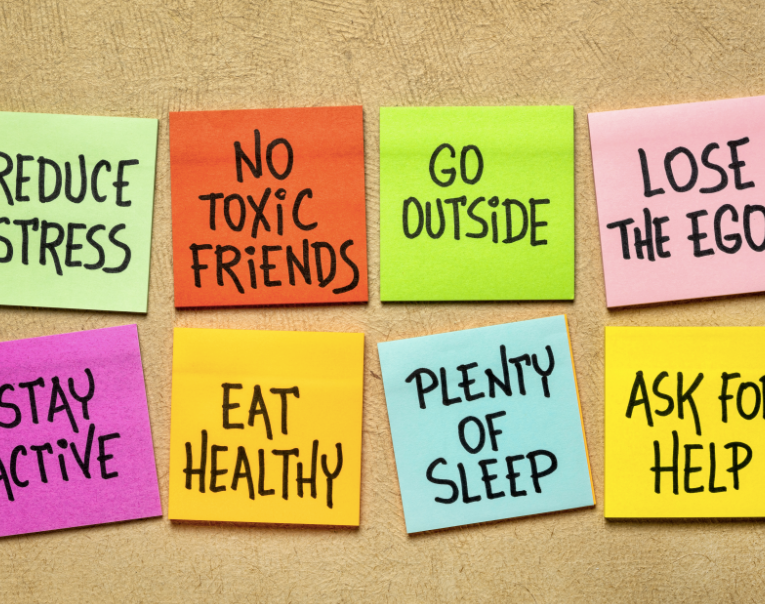Welcome to the blog
How to Create and Change Habits

December 22, 2024
Whenever I hear the word habit anymore, all I have running through my head is the new Ed Sheeran song that exclaims, “My bad habits lead to…,” prompting me to consider my habits. We all have them. We all know them well. As humans, we know how the saying goes – we are creatures of habit. Meaning, that we fall back into similar patterns of behavior that we know to be familiar and sometimes useful to us. They can come in all forms, too: the good, the bad, and the ugly! We create some of them to keep us organized, like tidying your home throughout the week or keeping a schedule or routine. We have others because they have become a part of our “norms,” like popping a piece of gum in your mouth before a date, holding the door open for others, or even the order we get ready in the morning. Then, we keep others for comfort or control, like biting our nails and turning on the tv to distract us from other things, and they ultimately end up sometimes doing more harm than good.
Habits and How We Create Them:
Initially, when the idea of habits was presented to me recently, it was by a friend of mine who had started reading the book, The Power of Habit: Why We Do What We Do in Life and Business by Charles Duhigg. I was fascinated by the information she shared with me from what she had learned from the author. I furthered my research by diving into a little more research from another author contributing to the literary work surrounding the topics, James Clear, author of Atomic Habits. Overall, here are the main takeaways that I was able to gather:
Tip 1 – Start Small:
Habit stacking is critical – once you have one in your repertoire, you can build. Be careful not to start with too many things. Too much at one time can be overwhelming and lead to a lack of follow-through. Instead, keep one main idea in mind and break it down into minimal steps to get there. Then, start with a bit of action.
Tip 2 – Instead of New, Think Different:
Instead of thinking of building new habits, instead change bad ones. For example, if you start your mornings on social media, change it to something more productive, like using that time to brush your teeth, read a book, journal, workout, etc.
Tip 3 – Remember to Reward!
Also, it is imperative to reward yourself when you finish a habit! Your reward can be a feeling of accomplishment or something more tangible, like a new outfit or a treat. It’s part of the habit loop: you have a cue, routine, and reward.
Thinking Illogically:
Clients often share that their dreams may feel too big, or ideas they have may seem wholly outrageous or out of reach. However, I would like to believe that no goal is too big! People defy the odds, but it takes a hint of courage to be the odd man out. We live in a world where we are constantly compared to our peers and other people. In a podcast featuring authors Brené Brown and Emmanuel Acho, they discuss the importance of being Illogical with our thinking. They describe this idea that we should look at social constructs and challenge the status quo from an academic perspective! For example, if I believe that I want to become a world-class musician, the odds may be stacked against me, but if I work hard and dedicate time, we can achieve great things.
Counseling can help Cultivating Courage to Create Change!
Now, it’s important to note that some individuals are more naturally adept at things than others. So, realistically, there may be some things that we cannot achieve. I encourage my clients to show bravery in the face of uncertainty, find something they are good at and love, and give it all you got! Despite what some may tell you, we can create change in our immediate environments and beyond. Thinking illogically means we are thinking outside of the box or system that has been put in front of us. Who tells us we can’t be all that we have ever dreamed of?
Begin Therapy in Austin, TX!
Looking to learn more about habits? Safe Space Healing Collective can help! We provide mental health counseling, as well as other mental health services. To begin counseling in Austin, TX follow these three steps:
- Contact our office to set up an appointment or to learn more information.
- Meet with one of our knowledgeable therapists.
- Start feeling more seen, heard, and understood!
Other Therapy Services We Offer:
Here at Safe Space Healing Collective, we offer counseling services for people of all ages in areas including Complex PTSD, PTSD, Attachment Trauma, Somatic Trauma Work, LGBTQIA+ mental health, Identity Exploration, Dissociation, Women’s Issues, Adolescent Issues, Anxiety, Depression, Troubled Childhood, Exploring Sexuality & Gender Expression, Blended Families, Healthy Communication & Conflict Resolution, Relationship Issues, Personal Growth, Life Transitions, Grief & Loss, Family Estrangement, Death & Dying, Career Transitions, Problems at Work & School, Interrupted sleep/Insomnia. Our therapists strive to post blogs regularly. We provide helpful information on a variety of mental health topics. To learn more about our therapists and our counseling services, please reach out to the Healing Collective today!
Leave a Reply Cancel reply
thank you!
We'll be in touch.
The safe space can be wherever you make it
2525 Wallingwood Dr, Suite 1503, Austin, TX 78746
info@safespacehealingcollective.com | 512.387.1964